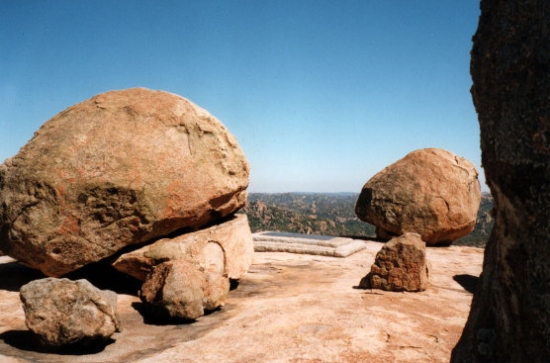
A farewell journey "home" to Zimbabwe.
When I first made aliyah, to live in Israel all those many years ago now, and I would say that I was from Zimbabwe, then called Rhodesia, most people had never heard of it. And those who knew that it was "somewhere in darkest Africa" couldn’t quite understand why, in that case, I wasn’t black!
Now everyone knows where it is and for the worst possible reasons. For the past several months Zimbabwe has been in the forefront of world news. Reports from journalists and observers have been telling the appalling story of a country in deep distress, drowning in economic free-fall, weighted down under the callousness of brutal leaders, its people struggling with extreme poverty, hunger and deprivation. A country simply falling apart. A land being destroyed.
Not such an unusual story, you might say, on the continent of Africa where such hardship is terrifyingly familiar, and deprivation the normal order of the day for the great majority of its people. But not here, not in Zimbabwe! This is a vast land blessed with fertile soil and industrious hard-working people. It was once called "the bread basket of Africa". How could this magnificent country have been reduced to being the basket case of Africa.
There was a time, during the 1990s when I used to go back to my "hometown" Bulawayo regularly, rediscovering my old roots. I reconnected with my old Jewish community and would sink into the warm embrace of a land and its people all so familiar to me even after so many years of living in my real "hometown" of Jerusalem.
It was always my great joy during these visits to plan and help organize Yom Haatzmaut celebrations for Israel’s Independence Day. Once we even recreated our own version of the official beacon-lighting ceremony performed every year on Mount Herzl in Jerusalem. We built our own giant menorah, veteran members of the community lit the flames in honor of community organizations and even the youngest lit a beacon in honor of their own new generation. It was very moving but also filled with a painful mood of loss and nostalgia. This was a community already disintegrating and disappearing. We were also in danger of possibly hastening this disappearance even further, not to mention destroying the entire neighborhood altogether with the leaping flames of our brightly burning beacon scattering embers all around with the deep-winter grass and trees all tinder dry.
But my last visit had been in 2001, at the height of the violence of what the Zimbabwean authorities like to call "Land Redistribution", but which was in fact a vengeful and violent and utterly cruel "land grab", dispossessing and driving out the farming community and wreaking havoc on the lives of millions of people, black and white. Unable to face the resulting decline and descent into a kind of madness I had not dared go back.
And now I had been invited to make a return visit. At first my instinct was to refuse. I was simply too afraid. Not a physical fear, not the fear that anything bad would happen to me. No, my fear was rather emotional and personal. How would I be able to endure the sight of this wonderful country so destroyed and diminished. How to deal with the sadness of my own Jewish community, a once lively and vibrant society of several thousand people, now reduced to less than ninety souls.
As it turned out, the days that I spent there may have been the worst of times but they were also the best of times. I found all the deprivation and suffering that I had feared and heard all the personal stories of daily lives that are hard and bitter and it just broke my heart. I wept for it all. My hometown Bulawayo was crumbling and its infrastructure destroyed, the roads pot-holed and left to ruin, the buildings shabby and the shops deserted or shuttered. People wandered the streets aimlessly, nowhere to go and nothing to do, with an unemployment rate running, officially, at eighty percent. Rows of empty shelves at the supermarkets, withered and pathetic vegetables. The beautiful old parks, once the city pride and joy, now utterly destroyed, a barren bleak wasteland.
But I also found a people, both the African community and the handful of whites and, for me most especially, the tiny remnant of the Jewish community who have remained there, hanging on with a determination, resilience and courage that were simply amazing. How ingenious they have all become. How adept at scrounging and scraping and making do. The electricity is out for most of the day most days. Some of the African townships I visited hadn’t had electricity for weeks on end. So they have learnt how to find wood and cook on open air fires in the backyard. They all tell me how nice and kind people have become, how supportive and caring of each other. They were all an inspiration to me.
I went with my dearest childhood friend Brenda to have a final cup of coffee the day before I left. Possibly the very last time we would ever meet. I had enough of the pathetic Zimbabwe dollars for only two cups of coffee. The South African Rands that I had specially brought with me I was giving away to friends, mainly to help them buy gasoline. With the magic foreign currency, Forex as it is called, you could buy anything on the black market, even gasoline, without having to wait in a line for days on end. The pretty young waitress must have overheard our conversation and seen my reluctance to spend my precious Rands on food, and when she returned with the coffee she also brought a huge piece of cake. She said that it was her gift to us.
Perhaps nothing quite so eloquently illustrates the country's free-fall into economic destruction as the currency. The expression "monopoly money" doesn’t even begin to describe it. I brought back with me several Zimbabwe bank notes, ranging in sums from 20 billion to 250 billion Zimbabwe dollars, not enough in fact to buy even a loaf of bread, if you were lucky enough to find bread to buy. A visit to the wonderful Museum of Natural History, once a true gem, now shabby and half in darkness, cost me one trillion dollars entrance fee. It is impossible to calculate the value of anything as exchange rates vary from day to day.
To see familiar faces and meet up again with old friends in the Jewish community was profoundly moving. I went with them to synagogue for Friday night Sabbath services. Just a handful of older people, voices echoing sadly in the far too large hall being used as a synagogue. But amazingly, there is a Rabbi, a young man from Israel with his wife and children, serving this community out of their sense of duty and responsibility. And there is the required "minyan" of ten men for every service!
If only the Rabbi could have seen us in our heyday, when we filled the huge old elegant synagogue, this vibrant deeply Zionist Jewish community. On the major High Holy Days and festivals we had overflow services in our community centre, the old Guild Hall across the road. We just took possession of the entire area and filled the street on those occasions.
In the grounds of the Guild Hall, the youth movement, Habonim, would meet every Sunday morning. Everyone attended, you were not asked how you felt about it, this is just what we all did on Sunday mornings. For all the years of my childhood I remember standing around a pathetic diseased little palm tree that did not grow one inch in all that time, and we would chant in unison the Habonim credo, Zadik ke tamar yifrach, "the upright shall flourish like the palm".
This was the heartland of our Jewish lives. This was where we had held community functions and festivities. We had staged concerts and pageants and plays, the children often performing, dressed in biblical garb. This was where with great elation we had celebrated Israel’s Independence Days, where we had sung Israeli songs and danced Israeli dances. This was where we had seen the first films of brave Israeli pioneers plowing the land, one hand on the rifle, in the reborn state.
As the community shrank, the hall was abandoned, fell into disuse and was finally sold, becoming first an Evangelical church and then a correspondence school. I stood outside the building now for a long and painful moment, but just didn’t have the heart to go inside. I didn’t think I could bear it. The old Habonim yard stands abandoned now, filled with all sorts of junk. The palm tree of course is gone.
One of Bulawayo's outstanding schools and the pride of the Jewish community was Carmel, the Jewish day school. In defiance of prevailing politics and public opinion in segregated Rhodesia, in 1965, the headmistress of Carmel had courageously accepted twelve black children for the school year. This liberal admissions policy was strictly upheld at Carmel School during the turbulent years until independence was gained for Zimbabwe.
The school curriculum included Hebrew, Jewish subjects, and even celebrated the Sabbath with prayers on Friday mornings, in which all the children at the school, regardless of color or creed, participated. The service would be conducted by the pupils themselves, and often this would be a black or an Indian or even a Moslem child. It was a privilege to attend Carmel. The school now has only one Jewish child left and the old curriculum has been replaced – no more Hebrew and no more Friday morning services.
The community is helped now and supported by the Jewish community in South Africa, by the American JDC and by a network of ex-Zimbabweans the world over. Food supplies are brought in by the African Jewish Congress headquartered in South Africa. The only hope for anyone at all in the country is help from outside, and the entire community, the churches and different volunteer and aid organizations all depend for survival on remittances and food supplies from family or friends abroad.
When I was growing up there, Rhodesia, as it was then called, had a Jewish community numbering eight thousand between the two major cities and other smaller centers. Altogether in the entire country today there are now perhaps just over two hundred.
Jews were intimately involved with the entire history of Rhodesia/Zimbabwe. In the same year that Bulawayo was declared a city, in 1894, there were already enough Jewish men to form the daily minyan for synagogue services. Even before that there were Jewish traders and merchants traveling in the as yet largely unknown country. They were among the first to open up the mining and cattle industries. The first white child born in Bulawayo was a Jewish girl. The first marriage performed in the new city was a Jewish one, as was the city's first burial and the city's first mayor. The Jewish community prospered amazingly and made outstanding contributions to the city as well as to the country in general. They were in the forefront of the business world, they were outstanding in medicine and the legal profession. They were actively involved in civic life, becoming mayors and city councillors and aldermen, even becoming prominent in politics. Bulawayo's "favourite son" was Abe Abrahamson, much loved and honored, who entered the political life of the country and served with great distinction as an MP and then as an outstanding Minister of Labor
Now there were ninety Jewish souls left in Bulawayo, and that number went down to 89 while I was there visiting. One of the veteran members left to be with her children in another country as so many have done over the past years. She left a huge gap behind.
Savyon Lodge is the Jewish old age home, comfortable and gracious and superbly well run, with its wide verandahs surrounding gardens with their huge trees and flowering shrubs. It is an oasis of peace and tranquility, a small island of sanity in a world gone mad. It also serves as a community centre, visitors to the town can stay there and its plentiful food is strictly kosher.
I had the very great honor and pleasure of giving the community a talk on Israel one evening at Savyon Lodge. There were perhaps forty people there, almost half of the community. For a brief moment it felt like old times – Jews meeting together to talk about things Jewish. It felt like a real social event, ending with the traditional wonderful tea with biscuits. It felt almost normal. For a moment you could forget the chaos outside.
I hope that I brought with me a sense that they were not abandoned or forgotten, that as a daughter of the community I remembered my roots and my upbringing, that my own Judaism and my Zionism and my passion for Israel had been nurtured here in this community, among these people. I wanted to acknowledge that and to give them a feeling of closeness and a connection with Israel. I hope that I did that. I felt I owed it to them.
My last view of the town was of the old synagogue, to say goodbye finally. That elegant old building had witnessed the entire history of the Jewish community for more than one hundred years. It is now a shell after a fire broke out there some years ago and the building was damaged beyond repair. Two young men of the community had dashed into the fiercely burning building and miraculously and heroically rescued the Torah scrolls from the flames. But the oldest member, then already 105 years old, Uncle Leizer as he was lovingly known by all, was utterly bereft. His old prayer shawl had been burnt and he now asked mournfully how he could possibly be buried without that old shawl to be wrapped in. He died just last year, at the age of 108!
It is always a heart lifting joy to return home to Israel, to catch the first glimpse of the beaches along the familiar coastline. I always feel a profound gratitude. But this time I brought back with me also a very great sadness that has continued to weigh heavily on me. The sadness of loss, of lives ruined and of the terrible waste of it all.
I went to my wonderful open-air fruit and vegetable market in the center of Jerusalem and wandered around in delight among the enormous piles of fruit, dates and figs, of peaches and grapes and huge gleaming mounds of brilliant red pomegranates. And I thought of the empty shelves that I had just seen and the withered vegetables and people burdened with the constant terrifying struggle to find food and fuel and water. How privileged we are, how blessed living in this land of Israel, our land overflowing with milk and honey.
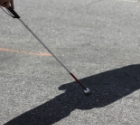 On Going Blind
On Going Blind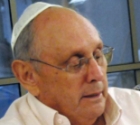 Leyland Goss 1936 – 2008
Leyland Goss 1936 – 2008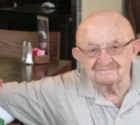 Max Geffen 1924 – 2008
Max Geffen 1924 – 2008 (302x450)-1451381711.jpg) Odeon Oscar
Odeon Oscar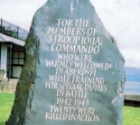 The Jewish Connection
The Jewish Connection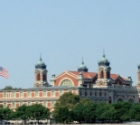 ellis island
ellis island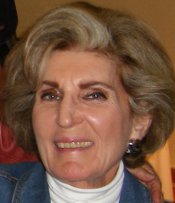 Freda Keet
Freda Keet